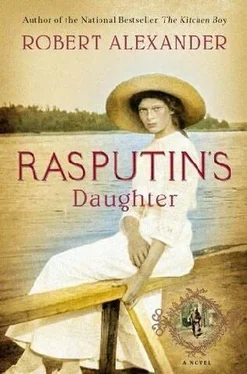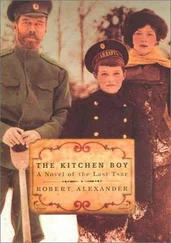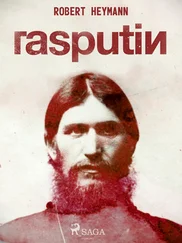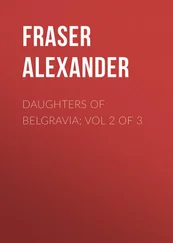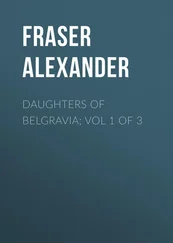“This is the Palace operator. One moment, please.”
My heart immediately speeded up. Despite the late hour, I assumed it was the Empress. The very next moment, however, there was a click and I immediately recognized the voice of the Empress’s only close friend, the person many were calling the second most powerful woman in all the Russias.
Speaking with the slight lisp that always made her sound as if she had a mouthful of porridge, Madame Vyrubova uttered the most commanding phrase in the nation: “I’m calling on urgent business from the Palace.”
She begged to know if my father was home, and I assured Anna Aleksandrovna that he was. Then I lowered the earpiece and let it hang from its long cord. It was good fortune that my father was indeed here, I thought as I hurried down the hall, for often toward midnight he would go out. Just the night before, Honorary Burgess Pestrikov had treated him to quantities of wine and food at the Restaurant Villa Rode; it was four in the morning when Papa had stumbled into the apartment and collapsed on the sofa, where he slept until ten. The night before that, he’d stayed out all night with Madame Yazininskaya, presumably at her flat, for he did not return until lunch the following day.
Passing through our dining room, I swerved around several cases of sweet red wine a councilor had just brought, a gift that particularly pleased Papa because of the Dry Laws the Tsar had decreed soon after the start of the war. I then skirted our brass samovar, its fire gone out, and the heavy oak table, which was laden with a basket of flowers and plates of biscuits and sweets, nuts, dried fruits, cakes, and other delicacies that appeared day in and day out for our stream of guests.
By the sounds from the salon, I assumed that was where I would find Papa. In fact, he was not there. Rather, I found the lone balalaika player, strumming the melancholy tunes of our land, and two women, both huddled on the floor. One was our eternally loyal maid, Dunya, one of Papa’s earliest disciples, who’d followed us from Siberia and who was, I couldn’t help but notice, getting fatter by the week. The second was Princess Kossikovskaya, a young beauty of the best society. The princess had a number of diamonds sparkling in her rich brown hair and hanging from her ears, while strands of huge pearls drooped from her neck, but right then and there, hunched over on her knees, she didn’t look so elegant. She was quite drunk.
And when I heard the beauty retch, I understood why Dunya, who was holding a basin to the young woman’s smeared lips, hadn’t answered the phone.
“Dunya, where’s Papa?” I demanded.
“Back in his study,” she said, with a quick wave over her shoulder.
I bit my lip, for it was not without some dread that I hurried out of the room and down the hall. Reaching the door of Papa’s room, I raised my hand to knock-but hesitated. We were never, ever supposed to interrupt when Papa was healing someone…and yet if he was being summoned by the Empress, wasn’t that more important? Absolutely, I thought, and I knocked firmly, albeit hesitantly.
A moment later came his gruff reply. “Da, da. Please enter at once!”
His study was small and narrow, with an icon and its oil lamp in one corner, an old oak desk, and, of course, his pathetic leather sofa, which was nearly rubbed bare. Perched on a chair in front of the sofa was Papa, wearing loose black pants, tall black leather boots, and a lilac kosovorotka, a shirt buttoned at the side of the collar. Every day any number of women begged for Papa’s attention, but I had no idea how he treated them. Peering in now, however, I saw my father leaning forward and holding his visitor, none other than Countess Olga Kurlova, by the knees. The countess, wearing a pink Parisian silk dress that appeared loose, perhaps even unbuttoned in the front, was one of the great beauties of the Empire, with thick blond hair and cheeks that were high and distinguished. She was from Moscow, I knew, and though her family was neither so very noble nor, from what I heard, so very rich, she was a favorite in the capital, sought after by society for her seductive looks and keen wit.
As if I had walked in on a pair of lovers, Countess Olga gasped and clutched at the top of her dress.
“What are you doing here?” Papa asked with a scowl. “I thought it was our other guest. You know you’re not supposed to bother me when my door is closed.”
Averting my eyes, I said quietly, “There’s a call of urgent business…from the Palace.”
“What’s that you say? Speak up, child!”
“There’s a call from the Palace… It’s urgent, Papa.”
All but forgetting about me, my father turned to the luscious countess and bragged, “Ah, Mama needs me. Mama needs me at the Palace.”
Horrified that a peasant would refer to so lofty a personage in such coarse terms, the countess stared at him in shock. While some members of the court were permitted to address Her Majesty by her first name and patronymic-Aleksandra Fyodorovna-her lowly subjects were supposed to refer to her either as the Tsaritsa or the Empress. Never, ever, as Mama.
“I don’t need them, I can just go back home to Siberia,” my father boasted, holding up a sloppy finger to make a fine point. “But they wouldn’t last six months on the throne without me! Really, not six months!”
“The phone, Papa!” I reminded. “You’re wanted on the telephone!”
“Of course…yes, the telephone.”
He kissed his right hand, then used that same hand to massage Countess Olga’s right knee. The countess, though, was none too pleased and jerked back, whereupon the back of the old leather sofa fell off. The visiting beauty uttered a stifled scream.
“Ah, now, don’t you worry, my tasty dish,” muttered Papa, as he slowly and drunkenly pushed himself to his feet. “One of those fat sisters from the women’s monastery slept on that sofa last week and broke it.”
Almost without effort, Papa bent over the countess and lifted the heavy piece into place with one hand. Swaying slightly, he then leaned down and patted his guest on her head.
“We’ll continue our purification later.”
“Papa!” I insisted.
He stretched one hand toward me and called weakly, “Yes, yes. Come help me, malenkaya maya.” My little one.
Understanding that he’d drunk too much, his “little one” was not eager to go to his side; I would have preferred simply to leave the room. But my mother in Siberia had long ago forgiven Papa his excesses, grateful for the three children he had given her, not to mention the finest house in the village and a field to till. So, as the oldest Rasputin female in the Petrograd household, I had no choice but to overlook things also.
Looking down at the countess one last time, Father made a drunken sign of the cross over her and intoned one of his favorite sayings: “Remember, great is the peasant in the eyes of God!”
As I helped him from his study, I stared at this terribly plain, even homely man, who was nothing less and nothing more than a muzhik-peasant-from Siberia. He was not dashing and debonair like the fathers of my classmates, many of whom were princes or counts. Instead, here was a person of only medium height, a semi-illiterate ox of a man who had toiled in the fields for years. He had light blue eyes, the kind that made people feel uncomfortable, his nose was long and slightly pocked and his skin wrinkled beyond his age, while his lips were thick and ripe with color. One look at him and anyone could tell he was from the wilds, for his long hair was dark and parted down the middle like a crooked dirt lane, and his beard, which was thick like an ancient forest, had a dark reddish-brown hue.
No, my father was not a handsome man, nor was he charming or witty or devilishly tall, as so many wrote. But he did have an extraordinarily magnetic presence. He could enter a palace room and, though at first all the nobles would stare down on this ugly peasant, within moments they would be listening to his every word.
Читать дальше
